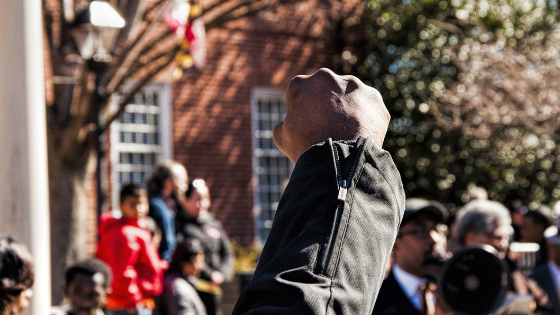Religious Freedom and The Politics of Outrage
According to Pulitzer prize-winning New York Times Journalist Nicholas Kristof, the best way for the Mainstream Media to build audiences in this competitive digital age is by 'reinforcing stereotypes and minimising nuance'. [1]Well, we saw both these behaviours in the SMH and ABC reporting of the leaked Ruddock Report last week. Last Wednesday's article in the SMH was titled 'Religious freedom review enshrines right of schools to turn away gay children and teachers', an unfortunate title that framed the discussion from that point on. Sadly neither ABC's 'The Drum' nor 'Hack' on Triple J did much to challenge that given narrative.This was disappointing on a number of levels.
Last Wednesday's article in the SMH was titled 'Religious freedom review enshrines right of schools to turn away gay children and teachers', an unfortunate title that framed the discussion from that point on. Sadly neither ABC's 'The Drum' nor 'Hack' on Triple J did much to challenge that given narrative.This was disappointing on a number of levels.
1) The title of their article - "Religious freedom review enshrines right of schools to turn away gay children and teachers" - was needlessly inflammatory.
Such headlines (and articles) play into the polarising outrage machine driving discourse in our internet age.Such a headline (and reporting) offended many gay people, and many Christians (particularly those around Christian schools) felt attacked.What should have been a serious discussion about a complex (albeit contested) issue has been blindsided by the 'politics of outrage'. This is not conducive to the civil debate necessary for a thriving democracy.
2) The article seems to insinuate that Christian schools are potential hotbeds of homophobia, ready to discriminate against gay students.
Yet there has been no allegation whatsoever of Christian schools discriminating against gay students.Indeed, Australian Association of Christian Schools executive officer Annette Pereira said her members did not know of any Christian schools expelling students on the basis of their sexual orientation:
We have been disappointed with the way religious schools have been unfairly characterised over the past week...We have no desire to be allowed to expel students because of their sexual orientation.”
Considering that Christian schools are some of the most welcoming and caring environments for students of all backgrounds, this insinuation (of unjust discrimination) is troubling.
3) Many if not most of the Christian schools actively encourage students from non-Christian homes to enrol.
This is with the transparent aim of sharing the gospel with them. Again, you wouldn't know this from the article(s).
4) Such reporting comes perilously close to presenting us with a false dichotomy:
Either you're for religious freedom, and therefore pro-discrimination against gay people (even though the term 'discrimination' is left undefined), or you're for gay people, and against religious freedom.Such dichotomy is false to the gospel of the Lord Jesus Christ, who a) died for all people (gay or straight), to reconcile them to God, and b) demands that people be free from government interference to have faith in Him (or not). In other words, Religious freedom, and loving gay people can and must go together.
5) No doubt the SMH reporting has impacted relationships between members of the Christian and gay communities.
Sadly there's always been tension and mistrust. But this sort of reporting only serves to make the polarisation worse through reinforcing stereotypes. It doesn't enlighten, but shuts down debate.
6) Outrage is being generated over a report that hasn't even been released yet.
I'm all for public conversation over public issues, but at the very least, shouldn't media ensure that their reporting is verifiable? We have no idea if what they've reported is accurate, nuanced, or qualified. And yet social and mainstream media is abuzz because of it.
7) There's already widespread misunderstanding about Religious freedom.
This reporting only makes it worse.
One would be forgiven for thinking from the SMH's reporting that religious freedom is a recent invention of the religious far right, about a good idea as Big Bash Cricket.From what I've seen, there's been little mention of the fact that Freedom of Religion is enshrined in Article 18 of the UN's International Covenant on Civil and Political Rights, to which Australia is a signatory. Christians like me are merely asking for this internationally recognised right to be reflected in Australian law.
8) Most interestingly, this so called right to discriminate against gay students was enshrined in law in 2013 by the then Labor government.
That's the same government headed by Julia Gillard (an Atheist), and which had as a front bench minister Penny Wong, a prominent member of the LGBTI community. Again, this detail was sadly absent from much of the reporting.Update: I've been notified that some reporting on this issue did mention Labor bringing in the current form of the Commonwealth Anti-discrimination Legislation. On Skynews, Labor minister Tanya Pilbersek made this point, and also said that religious schools 'do not use their practical right to discriminate.'
9) So should Christian schools be allowed to 'discriminate' against gay students?
The very framing of this question precludes any reasonable discussion (especially on social media) . A better place to start is by 'going upstream' in the discussion, and asking what is freedom of religion (and association), and how is this balanced against other rights in a free and open society.(For a measured and balanced response to the leaked report, I recommend this post from Associate Professor Neil Foster from the Newcastle University Faculty of Law. Update: Here's another excellent piece by Ridley College lecturer Michael Bird, on 'What right to Limit Religious Freedom'.) [1] Private conversation between John Inazu and Nicholas Kristof, in John D. Inazu, Confident Pluralism - Surviving and Thriving Through Deep Difference (Chicago: The University of Chicago Press, 2016), x.
